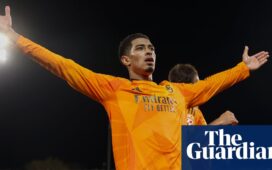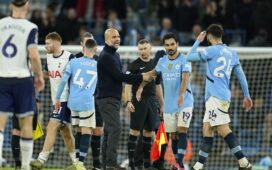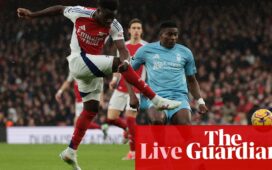Confront previous inconvenience and own the narrative. It is a staple PR play. And how Tottenham pushed it on Tuesday as they trumpeted the arrival of Antonio Conte as their new head coach.
The inconvenience lay in how Conte had turned them down on 4 June. At that point Spurs were 46 days into the search for a permanent successor to José Mourinho and, as we know, it would take 72 before they plumped for Nuno Espírito Santo – who had been out of work for the previous 37.
Nuno always felt like an uneasy fit, an appointment that failed to quicken the pulses of the supporters and he departed on Monday having virtually stopped them.
On 2 June, the Spurs chairman, Daniel Levy, had opened talks with Conte, who had left Internazionale seven days earlier. Very quickly, there was a confidence on the Spurs side that a deal could be struck – but then, within 48 hours, it was all off.
There was a blame game, with Tottenham letting it be known they were concerned about Conte’s demands for a budget to reshape the squad – and one that did not factor in the sale of Harry Kane which, in fairness, Levy was not considering, either.
The club also indicated they were worried as to whether Conte would commit to blooding young players, giving opportunities to players such as Oliver Skipp and Ryan Sessegnon. Nuno started Skipp in eight of his 10 Premier League games. Sessegnon has mainly been injured this season.
How did Conte feel about the framing of events? He was not happy, to put it bluntly, even if there was an acknowledgment on his side of Spurs’ need to project a version that defended them. Conte knows as well as anybody how cynical this business can be.
Which is why it was difficult not to smile when Conte was quoted on Spurs’ official channels explaining his decision to come this time. “Last summer our union did not happen because the end of my relationship with Inter was still too recent and emotionally too involved with the end of the season – so I felt that it wasn’t yet the right time to return to coaching.
“But the contagious enthusiasm and determination of Daniel Levy in wanting to entrust me with this task had already hit the mark. Now that the opportunity has returned, I have chosen to take it with great conviction.”

It is easy to wonder what has changed for Conte, assuming he still believes the Spurs squad needs surgery and it would not be performed cheaply.
Emerson Royal, Cristian Romero and Bryan Gil were signed in July and August – representing steps in the right direction – but, on the down side, the group still looks thin in areas and the January transfer window is a distance away. It is never ideal for a manager to take over mid‑season, which is why Conte has not done so since 2007‑08, with Bari, and this Spurs team are at a horribly low ebb, with five defeats in the league already.
The more pertinent question concerns what has changed for Levy and the answer lies in the toxicity of the mood around Tottenham’s stadium on Saturday during and after the 3-0 defeat against Manchester United.
It has been a catalogue of disaster for Levy since December, taking in the slump under Mourinho, which led to his sacking six days before the Carabao Cup final; the rush to join the doomed European Super League; the exit strategy of Kane (albeit one that was thwarted); and the botched hire of Nuno.
Levy has never had a tougher time in terms of his relationship with the fans and as he plotted his move after the United debacle he knew he needed something big. Something like, say, appointing the best out-of-work manager in the European game.
He came to feel this was the only move to appease the masses and, with it, there have been concessions, the kind Levy has been reluctant to make in the past, to do with control over transfer business. Pressed into a corner, Levy has had to make certain promises to Conte.
It is traditional at times such as these to talk about war chests but what Levy has said to Conte is that he will always back him for the right player. Which sounds promising or a little too open to interpretation, depending on your view. As ever, sales will be vital and much will hinge on the work of Fabio Paratici, whom Spurs announced on 12 June as their managing director of football, with effect from 1 July.
Conte worked productively with Paratici at Juventus from 2011 to 2014, winning the Serie A title every season, and it is safe to assume the pair spoke in early June when Levy first moved for Conte. It was widely reported at the time that Paratici had given his word to Levy that Conte would join Spurs but perhaps he did not have the working knowledge of the club back then; the capacity to be able to reassure Conte. That has changed.
Levy has spoken about how Spurs have been hit hard by the pandemic but as he has taken out loans to plug financial gaps – including those linked to the construction of the £1.2bn ground – the broader picture offers encouragement. According to Deloitte, the club’s most recent accounts show “matchday and commercial revenue grew to £94.5m (up 16%) and £160.5m (up 20%) respectively, demonstrating the revenue-generating potential that they have unlocked through the new stadium”.
Full capacity crowds have made projections within the league’s profit and sustainability rules even better.
The Fiver: sign up and get our daily football email.
With Levy, there has long been the sense that each managerial hire is a reaction to the previous departure, making it hard to discern a consistent blueprint or, to use the buzz phrase, a club DNA. He has bounced from Glenn Hoddle to David Pleat to Jacques Santini; from Juande Ramos to Harry Redknapp to André Villas-Boas; from Mauricio Pochettino to Mourinho.
What Conte promises to bring, however, chimes with what Levy and every Spurs fan wants: quick, hard-running football; intelligent, well‑drilled patterns; the remorseless will to win.
It would surely have been preferable for Levy to have secured Conte in June. The pair intend to retrieve the lost time.




